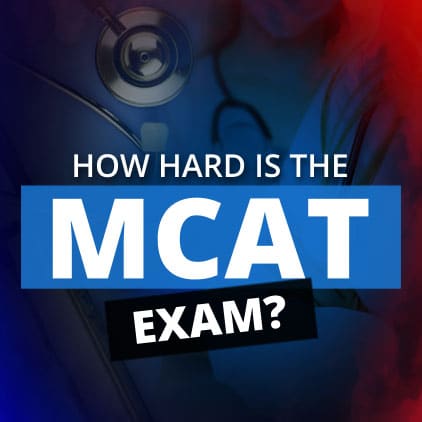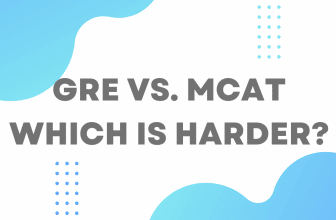How Hard is the MCAT Exam?
100% of the time.
We believe everybody should be able to make online purchases with confidence. And while our website doesn’t feature every test prep company or review course in the universe, we’re proud that the advice we offer and the information we provide is accurate, truthful, objective - and entirely free.
So how do we actually make money? It’s simple, our partners compensate us. While this may influence which products we review and write about, and where they show up on the site, it absolutely does not influence our recommendations or guidance, which are formed by hundreds of hours of research and analysis. Check out our partners here.
What’s the bottom line? We’re on your team and are passionate about helping you achieve your career goals, even if it means we don’t make a dime.

If you want to enroll in medical school, you have likely heard horror stories about the Medical College Admission Test (MCAT). Before prospective doctors can enroll in a medical school, they must pass the MCAT.
As a result, many undergrad students have a common question: How hard is the MCAT? This question is vital to know the answer to. Understanding the ins and outs of this exam and its difficulty are essential steps in preparing to take it.
This article will explain how the Association of American Medical College (AAMC) scores your MCAT, what makes the exam difficult, and some steps you can take to score well on the exam. By the end of this article, you’ll know the ins and outs of the MCAT and you’ll be ready to take on the MCAT.
How Is the MCAT Scored?
To understand the question: How hard is the MCAT? You first have to know how this test is scored. Several factors go into your MCAT score, and the AAMC scores it differently than many of the other tests you have probably taken.
Most test scores are based on how many questions you answered correctly. The AAMC scores your MCAT based on your performance compared to other test-takers. For example, if you score 97/100 but everyone else scores 99/100, your score would be below average.
The MCAT has three sections. Each section has low and high scores of 118, a high score of 132, and an average score of 125. Each question is worth two points, and wrong or unanswered questions are not penalized.
How Hard is the MCAT?
Now that you know how the MCAT is scored, it is time to answer the question: How hard is the MCAT? Unfortunately, the answer to this question is rather complicated.
The MCAT requires a lot of content knowledge. This exam covers various topics, including biology, chemistry, physics, and organic chemistry. You must have a firm understanding of these topics to do well on this exam.
However, what makes the MCAT hard is not the content but rather the quality of the individuals taking it. Since the AAMC bases your score on the performance of other students, it is essential to remember that the best and brightest students are taking the MCAT.
When you take the MCAT, you’re not competing against the test. You’re competing against other students who want to get into Medical School. As you can see, a lot goes into the question: How hard is the MCAT?
What Makes the MCAT Challenging?
Several factors make the MCAT difficult. First, the exam covers a lot of content. you’ll need a firm understanding of biology, chemistry, physics, and organic chemistry to do well on this exam.
In addition to content knowledge, the MCAT also tests your critical thinking and problem-solving skills. This exam is not simply a multiple-choice test. you’ll be required to critically think to answer some of the questions.
The MCAT is also a very long exam. It has three sections; each section is two hours long, and the exam will take six hours to complete. The length of this test can drain even the most challenging working students.
The MCAT also covers a wide breadth of different topics. The MCAT is a cumulative exam that tests multiple years of college classes. You’re being tested on your analysis and reasoning skills as well.
In addition to the variety of topics covered by the MCAT, the exam is also passaged-based. you’ll read six to seven-paragraph passages and answer questions based on what you read. The amount of time it takes to read and process this information is challenging. Additionally, this also means that you can’t memorize information.
How Can You Do Well on the MCAT?
Now that you know how hard the MCAT is, it is time to learn tips on scoring well on this exam.
First, it is crucial to start studying early. This exam covers a lot of content, and you’ll need time to master the material.
In addition to starting early, you must create a study plan. This exam is not something you can cram for the night before. you’ll need to study regularly to do well.
It is also essential to use high-quality study materials. The MCAT is a challenging exam, and you’ll need all the help you can get. Use practice questions and exams to prepare for the test.
Finally, it is vital to take care of yourself. The MCAT is a lengthy exam, and it can be taxing on your body and mind. It is important to get enough sleep and exercise in the weeks leading up to the exam. If you feel poorly, you decreases your chances of doing well on the exam.
FAQ About the MCAT
These are the answers to some frequently asked questions about the MCAT.
What is a good MCAT score?
A good MCAT score gets you into the medical school of your choice. The average MCAT score for students accepted into medical school is 511. The highest possible score on the MCAT is 528.
However, the idea of a “good” MCAT score is misleading. What is more important is to do your very best on the exam. If you want to have a specific goal, it is better to aim to be in the 90th percentile of your class.
Additionally, after taking the MCAT for the first time, research the medical schools and programs you’re interested in attending and identify the average MCAT scores from prior admission cycles. Determining the average score can help you match your MCAT score with schools of interest.
Is the MCAT scored on a curve?
No, the AAMC does not score the MCAT on a curve. The MCAT is a standardized test, and the AAMC determines your score based on how you compare to other students who have taken the exam, not on how well you do corresponds to a set bar or curve.
The lack of a curve can be both good and bad news. The good news is that you can get a very high score on the MCAT if you study hard and do well on the exam. The bad news is that if the average score on the MCAT goes up, your score could go down, even if you don’t necessarily do any worse.
The complicated nature of how the AAMC scores your MCAT is one of the reasons why it takes over a month to receive your score.
When should I take the MCAT?
The best time to take the MCAT is when you’re ready. You’re ready when you have studied enough and feel confident that you’ll do well on the exam. No particular time of year is more or less advantageous to take the exam.
Most students take the MCAT during their junior or senior year of college. Taking it during your junior or senior year gives you enough time to study for the exam and ensures your score will be valid for the upcoming admissions cycle.
If you’re not ready to take the MCAT during your junior or senior year, you can also take it during your gap year. Taking it during your gap year can be a good option if you need more time to study or want to retake the exam to improve your score.
One method students use to determine when to take the MCAT is when their scores stop improving. Taking several MCAT practice tests is an excellent way to gauge how prepared you’re and if you’re maximizing your potential.
Does the MCAT require knowledge from high-level undergraduate science courses?
No, the MCAT does not require knowledge from high-level undergraduate science courses. The exam covers the material taught in a typical intro-level biology, chemistry, and physics course.
If you have not taken these courses, or it has been a while since you took them, it is a good idea to brush up on the material before taking the MCAT. The AAMC, which creates and administers the MCAT, offers an online question bank that can help you review the material covered on the exam.
Additionally, there are many commercial study resources available that can also help you review for the exam. These resources usually come in the form of a prep course, practice tests, and review books.
Wrap Up
The MCAT is a challenging exam, but it is not impossible to score well on. How hard the MCAT is for you’ll depend on how prepared you’re and how much time you have to study.
The best way to prepare for the exam is to take practice tests, review the material covered in the exam, and develop a study plan. Additionally, you must be aware of the different sections of the exam and how you’ll score.
If you do all these things, you’ll be well on your way to getting a good MCAT score.




